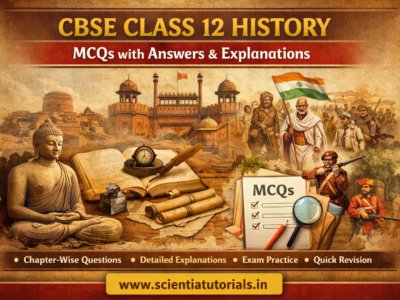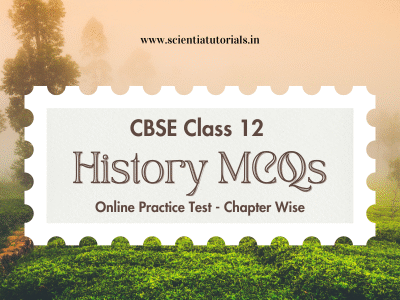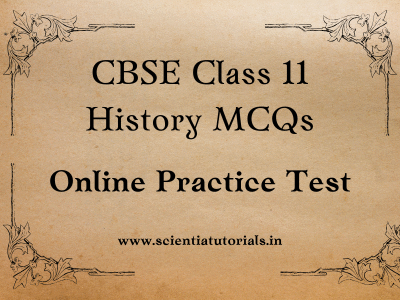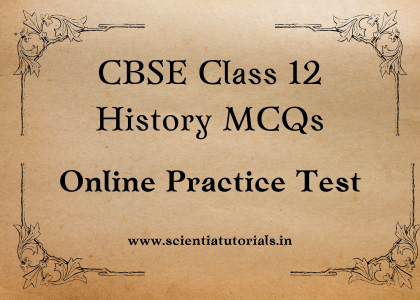CBSE Class 12 History MCQs – Online Practice Test
CBSE Class 12 History syllabus (NCERT-based – Themes in Indian History) Part Theme Range Historical Focus No. of Titles Part A Themes 1–4 Early Indian History & Civilizations 1–40 Part B Themes 5–9 Medieval India (Society, Culture, Empires) 41–90 Part …
Overview
CBSE Class 12 History syllabus (NCERT-based – Themes in Indian History)
| Part | Theme Range | Historical Focus | No. of Titles |
|---|---|---|---|
| Part A | Themes 1–4 | Early Indian History & Civilizations | 1–40 |
| Part B | Themes 5–9 | Medieval India (Society, Culture, Empires) | 41–90 |
| Part C | Themes 10 | Colonial Agrarian India | 91–100 |
| Part D | Themes 11–15 | Modern India, Nationalism & Constitution | 101–150 |
Part A: Early Societies and Cultures
Theme 1: Bricks, Beads and Bones – The Harappan Civilisation
Theme 2: Kings, Farmers and Towns – Early States and Economies
Theme 3: Kinship, Caste and Class – Early Societies
Theme 4: Thinkers, Beliefs and Buildings – Cultural Developments
Part B: Medieval India
Theme 5: Through the Eyes of Travellers – Perceptions of Society
Theme 6: Bhakti-Sufi Traditions – Changes in Religious Beliefs
Theme 7: An Imperial Capital – Vijayanagara
Theme 8: Peasants, Zamindars and the State – Agrarian Relations
Theme 9: Kings and Chronicles – The Mughal Courts
Part C: Modern India
Theme 10: Colonialism and the Countryside – Agrarian Change
Part D: Modern India
Theme 11: Rebels and the Raj – The Revolt of 1857 and Its Representations
Theme 12: Colonial Cities – Urbanisation, Planning and Architecture
Theme 13: Mahatma Gandhi and the Nationalist Movement
Theme 14: Understanding Partition – Politics, Memories, Experiences
Theme 15: Framing the Constitution – The Beginning of a New Era
Curriculum
- 15 Sections
- 150 Lessons
- Lifetime
- Part A: Early Societies and Cultures - Theme 1: Bricks, Beads and Bones – The Harappan CivilisationStrengthen your exam preparation with our CBSE Class 12 History MCQs – Online Practice Test with automatic scoring and per-question feedback based on Part A: Early Societies and Cultures – Theme 1: Bricks, Beads and Bones – The Harappan Civilisation. These NCERT-aligned multiple-choice questions cover important topics such as town planning, trade, social structure, craft production, and the decline of the Indus Valley Civilization. Designed strictly as per the CBSE Class 12 History syllabus, this interactive quiz provides instant scoring, detailed feedback, and concept-based learning. Ideal for board exam preparation, it helps students gain a deeper understanding of the Harappan Civilization’s urban development, art, architecture, and its lasting contribution to early Indian history.10
- 1.1Harappan Civilization Overview
- 1.2Town Planning in Harappa and Mohenjodaro
- 1.3Harappan Artifacts and Craft Production
- 1.4The Great Bath and Granaries – Architectural Insights
- 1.5Trade and Exchange in Harappan Civilization
- 1.6Decline of the Indus Valley Civilization
- 1.7Harappan Script and Seals – Archaeological Interpretation
- 1.8Harappan Society and Culture
- 1.9Agriculture and Urbanization in the Indus Valley
- 1.10Theories and Discoveries – Revisiting the Harappan Legacy
- Part A: Early Societies and Cultures - Theme 2: Kings, Farmers and Towns – Early States and EconomiesPrepare thoroughly for your exams with our CBSE Class 12 History MCQs – Online Practice Test with automatic scoring and per-question feedback based on Part A: Early Societies and Cultures – Theme 2: Kings, Farmers and Towns – Early States and Economies. These NCERT-based multiple-choice questions cover key topics such as the rise of Mahajanapadas, the Mauryan and post-Mauryan empires, trade and urbanization, coinage, and agrarian expansion. Designed strictly as per the CBSE Class 12 History syllabus, this interactive quiz provides real-time scoring, detailed feedback, and conceptual insights. Ideal for board exam preparation, it helps students strengthen their understanding of early Indian political and economic structures through engaging, exam-oriented practice.10
- 2.1Rise of Mahajanapadas and Magadha
- 2.2Use of Coins and the Growth of Trade in Ancient India
- 2.3Role of Ashoka and the Mauryan Administration
- 2.4Economic Activities in Early India – Agriculture and Craft Production
- 2.5Urban Centres and Trade Networks
- 2.6Land Grants and Agrarian Expansion
- 2.7Early Indian Epigraphy and Inscriptions
- 2.8Sources of Early Indian History – Megasthenes, Ashokan Edicts
- 2.9Exam-Oriented Practice on Early Indian Kingdoms
- 2.10Class 12 History Quiz – From Janapadas to Empires
- Part A: Early Societies and Cultures - Theme 3: Kinship, Caste and Class – Early SocietiesEnhance your preparation with our CBSE Class 12 History MCQs – Online Practice Test with automatic scoring and per-question feedback based on Part A: Early Societies and Cultures – Theme 3: Kinship, Caste and Class – Early Societies. These NCERT-aligned multiple-choice questions focus on important topics such as family structures, kinship systems, caste hierarchies, social norms, and gender relations in ancient India. Designed strictly according to the CBSE Class 12 History syllabus, this interactive quiz offers instant scoring, detailed explanations, and concept-based feedback. Ideal for board exam preparation, it helps students develop a clear understanding of how kinship, caste, and class shaped early Indian society and influenced social and cultural development.10
- 3.1Family and Lineage in Ancient India
- 3.2Patriarchy and Gender Relations
- 3.3Varna and Jati System – Social Hierarchies Explained
- 3.4Kinship Patterns in Early India
- 3.5Caste and Economic Roles – Ancient Indian Society
- 3.6Gotra, Marriage Rules and Social Practices – CBSE History Quiz
- 3.7Changes in Social Structure – Vedic to Gupta Period
- 3.8Historical Sources – Manusmriti and Dharmashastras
- 3.9Kinship and Social Order
- 3.10Understanding Class and Status in Ancient Indian Society
- Part A: Early Societies and Cultures - Theme 4: Thinkers, Beliefs and Buildings – Cultural DevelopmentsRevise effectively with our CBSE Class 12 History MCQs – Online Practice Test with automatic scoring and per-question feedback based on Part A: Early Societies and Cultures – Theme 4: Thinkers, Beliefs and Buildings – Cultural Developments. These NCERT-based multiple-choice questions cover significant topics such as the rise of Buddhism and Jainism, Vedic traditions, philosophical ideas, religious texts, and the art and architecture of stupas and temples. Designed strictly as per the CBSE Class 12 History syllabus, this online quiz offers instant scoring, detailed explanations, and concept-focused learning. Ideal for board exam preparation, it helps students understand how ancient thinkers and belief systems shaped India’s cultural and architectural heritage.10
- 4.1Rise of Buddhism and Jainism
- 4.2Teachings of Buddha and Mahavira
- 4.3Stupas and Monasteries – Art and Architecture
- 4.4Religious Developments during Mauryan and Gupta Periods
- 4.5Hinduism, Jainism, Buddhism – Exam-Oriented Practice Test
- 4.6The Role of Ashoka’s Dhamma – Class 12 History Quiz
- 4.7Bhakti Movement and Temple Culture – Early Roots
- 4.8Spread of Buddhism beyond India – Important MCQs
- 4.9Cultural Expressions in Early India – Class 12 Practice Test
- 4.10Philosophy, Art, and Faith – Indian Thought in Antiquity
- Part B: Medieval India - Theme 5: Through the Eyes of Travellers – Perceptions of SocietyPrepare confidently for your exams with our CBSE Class 12 History MCQs – Online Practice Test with automatic scoring and per-question feedback based on Part B: Medieval India – Theme 5: Through the Eyes of Travellers – Perceptions of Society. These NCERT-aligned multiple-choice questions cover the accounts of famous travellers like Al-Biruni, Ibn Battuta, and Marco Polo, highlighting their observations on India’s culture, economy, governance, and social life. Designed strictly as per the CBSE Class 12 History syllabus, this interactive quiz provides instant scoring, detailed feedback, and concept-based learning. Ideal for board exam preparation, it helps students understand how travellers’ narratives serve as valuable historical sources for reconstructing medieval Indian society.10
- 5.1Accounts of Al-Biruni and Ibn Battuta
- 5.2Marco Polo and European Impressions of India
- 5.3Medieval Indian Society through Foreign Eyes
- 5.4Travelogues as Historical Sources – Exam-Oriented Practice
- 5.5Social and Cultural Life in Medieval India – Key Questions
- 5.6Economic Activities as Seen by Foreign Travellers
- 5.7Religion and Tolerance in Indian Society – MCQ Practice
- 5.8Comparing Accounts – Al-Biruni vs Ibn Battuta
- 5.9The Value of Travel Literature in History Writing
- 5.10Travellers’ Observations and Insights
- Part B: Medieval India - Theme 6: Bhakti-Sufi Traditions – Changes in Religious BeliefsEnhance your understanding of Indian culture with our CBSE Class 12 History MCQs – Online Practice Test with automatic scoring and per-question feedback based on Part B: Medieval India – Theme 6: Bhakti-Sufi Traditions – Changes in Religious Beliefs. These NCERT-based multiple-choice questions explore key aspects of the Bhakti and Sufi movements, their teachings, major saints, spiritual ideals, and their role in promoting religious harmony. Designed strictly as per the CBSE Class 12 History syllabus, this interactive quiz provides instant scoring, detailed explanations, and insightful feedback. Ideal for board exam preparation, it helps students strengthen their conceptual understanding of how Bhakti and Sufi traditions transformed India’s religious and cultural landscape.10
- 6.1Evolution of Bhakti Movement – CBSE Class 12 History MCQs
- 6.2Major Bhakti Saints – Kabir, Mirabai, and Namdev
- 6.3Sufi Orders and Their Teachings – Class 12 Practice Test
- 6.4Role of Temples, Dargahs, and Shrines in Medieval India
- 6.5Interaction between Bhakti and Sufi Traditions
- 6.6Religious Harmony and Change – Exam-Oriented Practice
- 6.7Regional Variations in Bhakti Movements – South to North India
- 6.8Saints, Sufis and Society – Class 12 History Quiz
- 6.9Influence of Bhakti and Sufi Ideas on Indian Culture
- 6.10Literary Expressions of Devotion – Poetry and Philosophy
- Part B: Medieval India - Theme 7: An Imperial Capital – VijayanagaraPrepare efficiently for your exams with our CBSE Class 12 History MCQs – Online Practice Test with automatic scoring and per-question feedback based on Part B: Medieval India – Theme 7: An Imperial Capital – Vijayanagara. These NCERT-aligned multiple-choice questions cover major aspects of the Vijayanagara Empire, including its political administration, economic prosperity, urban planning, architecture, religion, and cultural achievements. Designed strictly according to the CBSE Class 12 History syllabus, this interactive quiz provides real-time scoring, detailed explanations, and performance feedback to help students master key concepts. Ideal for board exam preparation, it enables learners to explore the grandeur and historical significance of Vijayanagara as a powerful imperial capital in medieval South India.10
- 7.1Foundation of Vijayanagara Empire
- 7.2Kings and Administration under Krishnadevaraya
- 7.3Hampi – Architecture and Urban Planning
- 7.4Economy and Trade under the Vijayanagara Empire
- 7.5Religion and Culture in Vijayanagara Period
- 7.6Role of Amaranayakas and Feudal Structure
- 7.7Vijayanagara Art, Literature, and Temples
- 7.8Causes of Decline of the Vijayanagara Empire
- 7.9Political and Cultural Legacy – Exam-Oriented Practice
- 7.10Vijayanagara as Imperial Capital – Class 12 History Test
- Part B: Medieval India - Theme 8: Peasants, Zamindars and the State – Agrarian RelationsBoost your preparation with our CBSE Class 12 History MCQs – Online Practice Test with automatic scoring and per-question feedback based on Part B: Medieval India – Theme 8: Peasants, Zamindars and the State – Agrarian Relations. These NCERT-aligned multiple-choice questions explore key aspects of Mughal agrarian structure, revenue systems, roles of peasants and zamindars, and the relationship between the rural economy and the Mughal administration. Designed strictly according to the CBSE Class 12 History syllabus, this interactive quiz provides instant scoring, detailed explanations, and analytical feedback. Ideal for board exam preparation, it helps students understand the complex agrarian dynamics that shaped India’s economy and society during the Mughal period.10
- 8.1Mughal Agrarian System
- 8.2Revenue System under Akbar and Todar Mal
- 8.3Role of Zamindars in Mughal Administration
- 8.4Rural Society and Peasant Life
- 8.5Land Revenue and Economic Policies
- 8.6Agriculture, Irrigation and Crop Patterns
- 8.7Changing Agrarian Relations during the Mughal Era
- 8.8Role of Women in Agrarian Economy
- 8.9Mughal Administration and Land Reforms
- 8.10Peasant Movements and Agrarian Distress in Medieval India
- Part B: Medieval India - Theme 9: Kings and Chronicles – The Mughal CourtsStrengthen your exam readiness with our CBSE Class 12 History MCQs – Online Practice Test with automatic scoring and per-question feedback based on Part B: Medieval India – Theme 9: Kings and Chronicles – The Mughal Courts. These NCERT-based multiple-choice questions cover key topics such as Mughal kingship and ideology, court culture, administrative policies, Persian chronicles, and the political significance of texts like the Akbarnama and Ain-i-Akbari. Designed strictly as per the CBSE Class 12 History syllabus, this interactive quiz provides instant scoring, detailed explanations, and performance insights. Ideal for board exam preparation, it helps students gain a clear understanding of how Mughal chronicles shaped the perception of power, culture, and governance in medieval India.10
- 9.1Mughal Kingship and Ideology
- 9.2Akbarnama and Ain-i-Akbari – Historical Sources
- 9.3Court Culture under Akbar, Jahangir, and Shah Jahan
- 9.4Art and Architecture in Mughal India
- 9.5Political Ideology and Divine Kingship in Mughal Empire
- 9.6Persian Chronicles and Court Historians
- 9.7Role of Women and Nobility in Mughal Courts
- 9.8Mughal Administrative Policies
- 9.9The Decline of Mughal Power – Causes and Consequences
- 9.10Cultural Synthesis during Mughal Rule
- Part C: Modern India - Theme 10: Colonialism and the Countryside – Agrarian ChangePrepare effectively for your board exams with our CBSE Class 12 History MCQs – Online Practice Test with automatic scoring and per-question feedback based on Part C: Modern India – Theme 10: Colonialism and the Countryside – Agrarian Change. These NCERT-aligned multiple-choice questions focus on the impact of British land revenue systems such as the Permanent Settlement, Ryotwari, and Mahalwari, along with peasant revolts and agrarian unrest. Designed strictly according to the CBSE Class 12 History syllabus, this interactive quiz provides instant scoring, detailed explanations, and performance feedback. Ideal for exam preparation, it helps students understand the transformation of rural India under colonial rule and the struggles faced by peasants during British agrarian policies.10
- 10.1British Land Revenue Systems
- 10.2Permanent Settlement, Ryotwari and Mahalwari Systems
- 10.3Peasant Movements and Agrarian Revolts under Colonial Rule
- 10.4Indigo Revolt and Its Legacy – Class 12 History Quiz
- 10.5Changing Agrarian Economy under the British Raj
- 10.6Role of Zamindars and British Policies – Exam Practice
- 10.7Colonial Exploitation in Indian Countryside
- 10.8Social and Economic Effects of Land Revenue Reforms
- 10.9Peasants’ Voices and Resistance Movements – Key MCQs
- 10.10Agrarian India under British Rule – Exam-Oriented Practice
- Part D: Modern India - Theme 11: Rebels and the Raj – The Revolt of 1857 and Its RepresentationsRevise key historical concepts with our CBSE Class 12 History MCQs – Online Practice Test with automatic scoring and per-question feedback based on Part D: Modern India – Theme 11: Rebels and the Raj – The Revolt of 1857 and Its Representations. These NCERT-based multiple-choice questions cover the causes, course, and consequences of the Revolt of 1857, highlighting major leaders, regional uprisings, and British and Indian perspectives on the event. Designed strictly as per the CBSE Class 12 History syllabus, this interactive quiz provides instant scoring, detailed feedback, and conceptual clarity. Perfect for board exam preparation, it helps students understand how the Revolt of 1857 became a defining moment in India’s struggle against colonial rule.10
- 11.1Causes of the Revolt of 1857 – CBSE Class 12 History MCQs
- 11.2The Course of the Revolt of 1857 – Major Events and Leaders
- 11.3Impact and Consequences of the Revolt of 1857
- 11.4British Policies and Indian Discontent – Pre-1857 Situation
- 11.5Regional Centres of Rebellion – Delhi, Kanpur, Lucknow, Jhansi
- 11.6Role of Rani Lakshmi Bai, Mangal Pandey and Bahadur Shah Zafar
- 11.7Representations of 1857 in British and Indian Accounts
- 11.8Revolt of 1857 as First War of Independence
- 11.9Peasants, Sepoys and Zamindars – Participation in the Revolt
- 11.10Historiography and Interpretations of 1857
- Part D: Modern India - Theme 12: Colonial Cities – Urbanisation, Planning and ArchitectureStrengthen your preparation with our CBSE Class 12 History MCQs – Online Practice Test with automatic scoring and per-question feedback based on Part D: Modern India – Theme 12: Colonial Cities – Urbanisation, Planning and Architecture. These NCERT-aligned multiple-choice questions explore the growth of colonial cities like Calcutta, Bombay, and Madras, the impact of British urban planning, architectural styles, and the social and spatial divisions created during the colonial period. Designed strictly according to the CBSE Class 12 History syllabus, this interactive quiz provides instant scoring, detailed feedback, and conceptual understanding. Ideal for board exam preparation, it helps students analyze how urbanization and architecture reflected colonial power and transformed India’s cityscapes.10
- 12.1Urbanization under British Rule – CBSE Class 12 History MCQs
- 12.2Rise of Presidency Towns – Calcutta, Bombay and Madras
- 12.3Colonial Architecture – Indo-Saracenic and Neo-Classical Styles
- 12.4Urban Planning and City Design in Colonial India
- 12.5Role of Railways, Ports and Industry in Urban Growth
- 12.6Segregation and Social Spaces in Colonial Cities
- 12.7Life in Colonial Cities – Exam-Oriented Practice
- 12.8The Making of New Delhi – Capital and Symbol of Power
- 12.9Class 12 History Quiz – Changing Urban Landscapes
- 12.10Colonialism and Cultural Transformation in Indian Cities
- Part D: Modern India - Theme 13: Mahatma Gandhi and the Nationalist MovementPrepare comprehensively with our CBSE Class 12 History MCQs – Online Practice Test with automatic scoring and per-question feedback based on Part D: Modern India – Theme 13: Mahatma Gandhi and the Nationalist Movement. These NCERT-based multiple-choice questions cover key topics such as Gandhi’s philosophy of non-violence, major movements like Non-Cooperation, Civil Disobedience, and Quit India, along with his role in uniting India’s diverse communities during the freedom struggle. Designed strictly as per the CBSE Class 12 History syllabus, this interactive quiz offers instant scoring, detailed feedback, and conceptual insights. Ideal for board exam preparation, it helps students strengthen their understanding of Gandhi’s leadership and the evolution of India’s nationalist movement.10
- 13.1Gandhi’s Role in Indian Freedom Struggle
- 13.2Non-Cooperation Movement – Objectives and Outcomes
- 13.3Civil Disobedience Movement – Key Events and Impacts
- 13.4Quit India Movement – The Final Phase of Struggle
- 13.5Gandhi’s Philosophy of Non-Violence and Satyagraha
- 13.6Role of Women and Youth in the Freedom Movement
- 13.7Gandhi vs Other National Leaders – Ideological Debates
- 13.8Gandhi’s Mass Mobilization Strategies – Class 12 History Quiz
- 13.9Sources of Gandhian Era – Newspapers, Letters, and Autobiography
- 13.10Gandhi and India’s Road to Independence – Exam-Oriented Practice
- Part D: Modern India - Theme 14: Understanding Partition – Politics, Memories, ExperiencesRevise effectively with our CBSE Class 12 History MCQs – Online Practice Test with automatic scoring and per-question feedback based on Part D: Modern India – Theme 14: Understanding Partition – Politics, Memories, Experiences. These NCERT-based multiple-choice questions explore the political developments leading to the Partition of India, the roles of the Indian National Congress and the Muslim League, and the human experiences of migration, displacement, and trauma. Designed strictly as per the CBSE Class 12 History syllabus, this interactive quiz offers instant scoring, detailed explanations, and concept-based learning. Ideal for board exam preparation, it helps students understand the complex political, social, and emotional dimensions of India’s Partition in 1947.10
- 14.1Causes of Partition of India (1947) – CBSE Class 12 History MCQs
- 14.2Role of Muslim League and Congress in Partition Politics
- 14.3Impact of British Policies – Divide and Rule to Mountbatten Plan
- 14.4Communal Violence and Mass Migrations – Human Tragedy of 1947
- 14.5Partition through Personal Narratives and Oral Histories
- 14.6Political Negotiations before Independence – Exam-Oriented Practice
- 14.7Women, Refugees and Partition Experiences
- 14.8Partition and Its Long-Term Socio-Political Impact
- 14.9Historiography of Partition – Different Perspectives
- 14.10Memory and Trauma of the Partition – Class 12 Practice Test
- Part D: Modern India - Theme 15: Framing the Constitution – The Beginning of a New EraPrepare confidently for your board exams with our CBSE Class 12 History MCQs – Online Practice Test with automatic scoring and per-question feedback based on Part D: Modern India – Theme 15: Framing the Constitution – The Beginning of a New Era. These NCERT-aligned multiple-choice questions focus on the making of the Indian Constitution, the role of the Constituent Assembly, key debates, and contributions of leaders like Dr. B.R. Ambedkar and Jawaharlal Nehru. Designed strictly as per the CBSE Class 12 History syllabus, this interactive quiz provides instant scoring, detailed explanations, and performance feedback. Ideal for board exam preparation, it helps students understand how India’s Constitution laid the foundation for democracy, justice, and equality in a new era.10
- 15.1Making of the Indian Constitution – CBSE Class 12 History MCQs
- 15.2Role of the Constituent Assembly and Its Debates
- 15.3Dr. B.R. Ambedkar’s Contributions to the Constitution
- 15.4Challenges in Nation-Building – Partition, Refugees, Integration
- 15.5Fundamental Rights and Directive Principles – Exam-Oriented MCQs
- 15.6Drafting Committees and Their Work – Class 12 History Quiz
- 15.7Democratic Vision and Challenges in the Early Republic
- 15.8Key Personalities – Jawaharlal Nehru, Rajendra Prasad, and Others
- 15.9Social Justice, Equality, and Inclusion in the Constitution
- 15.10India’s Transition to Democracy – Exam-Oriented Practice




